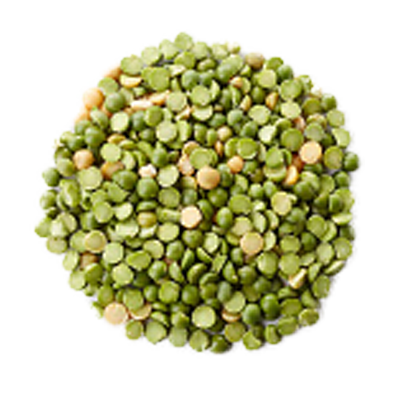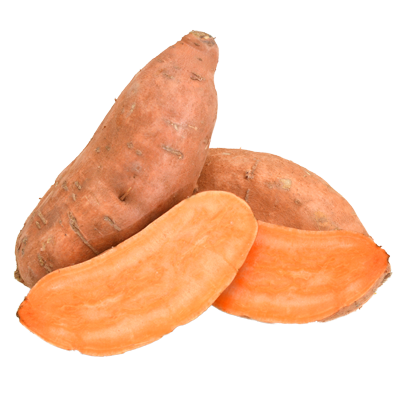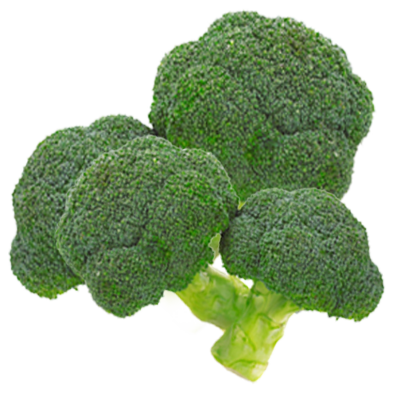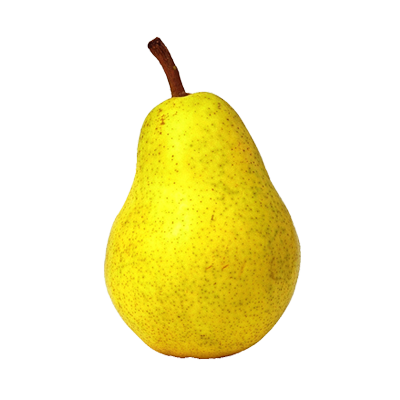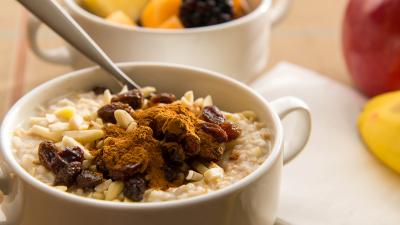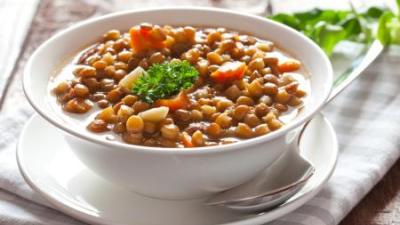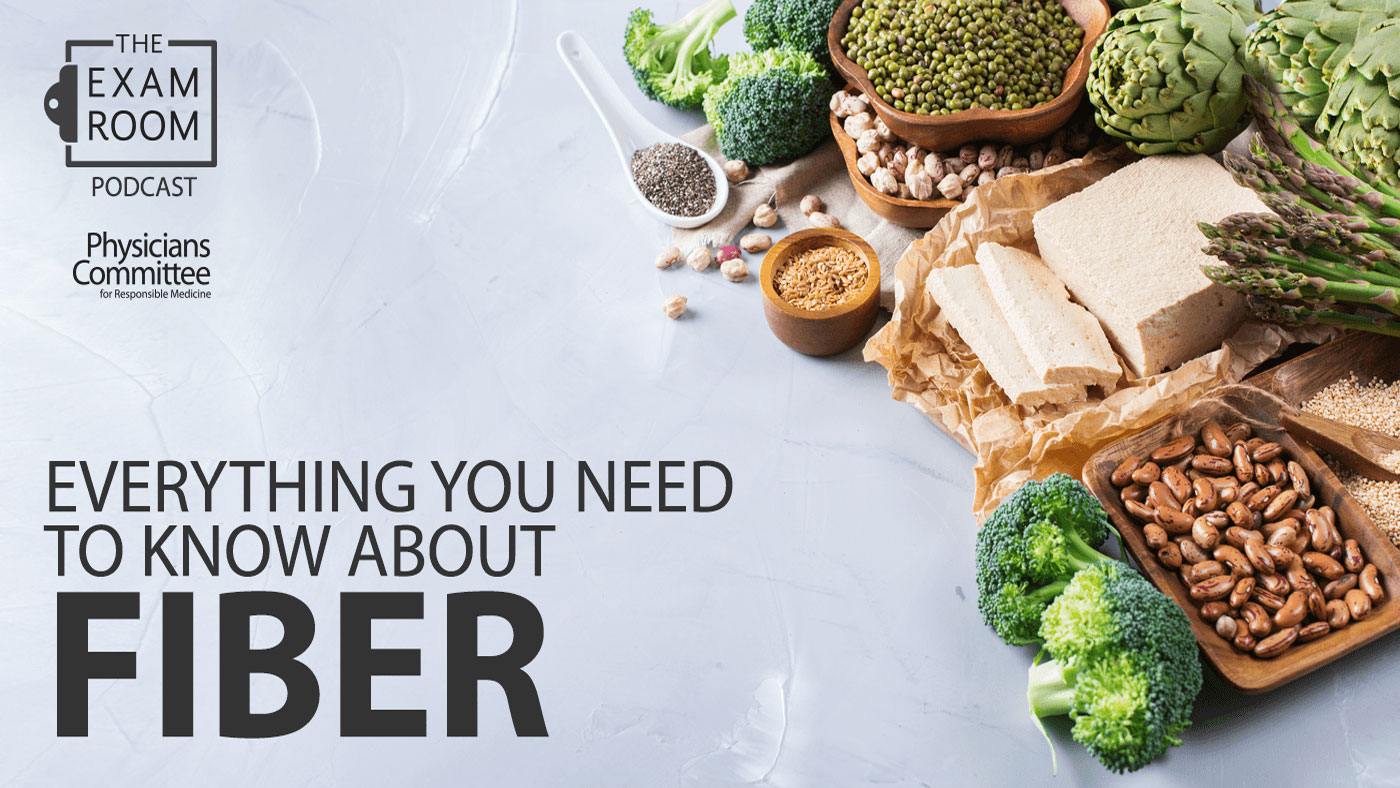Fiber
Fill Up on 40 Grams of Fiber a Day.
Fill your plate with plant-based whole foods to give your body the fiber it needs to stay healthy.
Fiber in vegetables, fruits, beans, and whole grains helps with digestion, weight loss, heart health, and cancer prevention. It can even increase your life span. Meat and dairy products contain no fiber—it’s found only in plant foods.
The Two Types of Fiber
Soluble fiber: Dissolves in water to form a gel. This gel is then easily digested by the bacteria in our guts and helps to promote a healthy gut microbiome.1 When soluble fiber is fermented in the large intestine, it increases certain hormones that promote satiety, or a feeling of fullness, which is why high-fiber diets may help with weight loss.2 Soluble fiber also increases the excretion of cholesterol in the stool and can help to lower total and LDL cholesterol in the blood.3
Insoluble fiber: Does not dissolve in water and passes through our guts mostly intact. Insoluble fiber bulks up our stool, helping to prevent constipation.3 This has two main benefits: First, it reduces the time that the lining of our gut is in contact with potential cancer-causing compounds in our food. Second, it traps fat molecules in the gut, reducing the number of calories absorbed from the food we have eaten, which can help with weight loss.
Plant-based foods contain a combination of both of these types of fiber, and the proportion of each may vary based on the food. While most people get only 10 to 15 grams of fiber a day, we recommend at least 40 grams per day for gut and metabolic health.
Heart Health
Fiber plays an important role in keeping our circulation and heart health strong. One important way this happens is through removing excess cholesterol through the digestive tract, as mentioned above. A pooled analysis of 10 cohort studies in the United States, including more than 300,000 people, found that those who ate more fiber had a lower risk of having a heart attack and a lower risk of dying from a heart attack.4 Another meta-analysis found each additional 7 grams of fiber reduced the risk of heart disease by 9%.5
In addition to this, healthy gut bacteria digest soluble fiber to produce short-chain fatty acids (SCFAs). SCFAs are absorbed into our blood and signal to the liver to reduce the production of cholesterol and signal to other cells to take up more cholesterol from the blood resulting in lower total cholesterol levels.6 So by helping the body to get rid of excess cholesterol, as well as reducing our own production of it, fiber plays a critical role in keeping cholesterol at a healthy level.
Gut Health
Fiber is not only essential for keeping you “regular,” but it also works to keep the cells that line your digestive tract healthy. Since fiber is bulky and helps to keep contents moving smoothly through your system, this reduces any contact that your cells would have with potential toxins. In addition, fiber acts as fuel for our healthy gut bacteria, promoting the growth of health-promoting bacteria, as well as diversity.7,8 Having well-fed, well-balanced gut bacteria is a crucial part of being healthy.
The SCFAs that the gut bacteria produce have many benefits beyond maintaining healthy cholesterol levels, including strengthening the intestinal lining, helping with mineral absorption, balancing blood sugar, increasing feelings of fullness, contributing to weight loss, reducing inflammation, and influencing gene expression.9-11
Diabetes
Eating a high-fiber diet can reduce diabetes risk. Research published in Diabetologia found that those who ate the most fiber (above 26 grams per day) had an 18% reduced risk of diabetes compared with those who ate the least.12 Because high-fiber foods fill you up with fewer calories, promote a feeling of fullness, and reduce the number of calories absorbed from the gut, those who eat high-fiber foods tend to have lower body weights, which further reduces diabetes risk.13-15 In addition, fiber slows down the digestion of sugar, leading to a slow release of sugar into the bloodstream, which helps with balancing blood glucose levels.
Cancer
Fiber helps to fight certain types of cancer. For hormonal cancers such as breast and prostate cancer, eating a high-fiber diet is beneficial because fiber can remove excess hormones from the body, just as it removes cholesterol.16,17 Estrogen, for example, can be removed through the digestive tract if a person is eating sufficient fiber in their diet, reducing risk for breast and prostate cancers. Fiber also comes packaged together with other beneficial antioxidants and nutrients, which may contribute to the reduced risk of such cancers.
When it comes to digestive cancers, eating plenty of fiber helps to make sure that carcinogens don’t get the chance to interact with cells lining our digestive system by keeping our digestion moving along swiftly. Fiber can even help those who have already been diagnosed with cancer. In a study of more than 1,500 participants diagnosed with colorectal cancer, every 5 grams of fiber added to their diets reduced the risk of dying by 25% over an eight-year period.18 The benefit comes not only from improved digestion but also from better insulin sensitivity, reduced inflammation, and healthier gut flora.
Guess how much fiber is in a...
Half cup of lentils?
7.8 grams
Cup of sweet potatoes?
6.6 grams
Cup of broccoli?
5.1 grams
Cup of raspberries?
8 grams
A pear?
5.5 grams
Fiber is the most important nutrient for overall health. Fiber-rich fruits, vegetables, legumes, and whole grains will keep you satisfied while reducing your risk of chronic diseases.
Anna Herby, DHSc, RD, CDCES, Nutrition Education Specialist, Physicians Committee
Plant-Powered Prescription for Fiber
Instead of counting calories, count grams of fiber! Aim for 40 grams each day with these tips:
- Swap out meat for lentils and beans, aiming for at least 1/2 cup of beans each day.
- Eat oatmeal or a baked sweet potato with fresh fruit for breakfast.
- Choose whole-wheat, rye, or pumpernickel bread rather than white bread.
- Similarly, choose whole grains over refined grains when possible.
- Swap out fruit juice for whole fruit, which is still hydrating but also has more fiber.
Unleash the Potential of 38 Trillion Gut Microbes with Dr. Will Bulsiewicz
There are 38 trillion gut microbes living inside of you.
Recipes
Below are just a few delicious recipes that can help your body get the fiber it needs to stay healthy.
Fiber Checklist
The Quick Fiber Check is a handy little tool. Using its simple scoring concept, which takes only a minute or two to learn, you’ll automatically be able to estimate the fiber content of virtually everything in the grocery store.
References
- Guan ZW, Yu EZ, Feng Q. Soluble dietary fiber, one of the most important nutrients for the gut microbiota. Molecules. 2021;26(22):6802. doi:10.3390/molecules26226802
- Freeland KR, Wilson C, Wolever TM. Adaptation of colonic fermentation and glucagon-like peptide-1 secretion with increased wheat fibre intake for 1 year in hyperinsulinaemic human subjects. Br J Nutr. 2010;103(1):82-90. doi:10.1017/S0007114509991462
- McRorie JW, Fahey GC. A review of gastrointestinal physiology and the mechanisms underlying the health benefits of dietary fiber: matching an effective fiber with specific patient needs. Clin Nurs Stud. 2013;1(4):82-92. doi:10.5430/cns.v1n4p82
- Pereira MA, O'Reilly E, Augustsson K, et al. Dietary fiber and risk of coronary heart disease: a pooled analysis of cohort studies. Arch Intern Med. 2004;164(4):370-376. doi:10.1001/archinte.164.4.370
- Threapleton DE, Greenwood DC, Evans CE, et al. Dietary fibre intake and risk of cardiovascular disease: systematic review and meta-analysis. BMJ. 2013;347:f6879. doi:10.1136/bmj.f6879
- Deng C, Pan J, Zhu H, Chen ZY. Effect of gut microbiota on blood cholesterol: a review on mechanisms. Foods. 2023;12(23):4308. doi:10.3390/foods12234308
- Aljuraiban GS, Algabsani SS, Sabico S, AlShammari S, Aljazairy EA, Al-Musharaf S. Types of fiber and gut microbiota composition and diversity among Arab females. Saudi J Biol Sci. 2023;30(9):103767. doi:0.1016/j.sjbs.2023.103767
- So D, Whelan K, Rossi M, et al. Dietary fiber intervention on gut microbiota composition in healthy adults: a systematic review and meta-analysis. Am J Clin Nutr. 2018;107(6):965-983. doi:10.1093/ajcn/nqy041
- Tomova A, Bukovsky I, Rembert E, et al. The effects of vegetarian and vegan diets on gut microbiota. Front Nutr. 2019;6:47. doi:10.3389/ fnut.2019.00047
- Alexander C, Swanson KS, Fahey GC Jr, Garleb KA. Perspective: physiologic importance of short-chain fatty acids from nondigestible carbohydrate fermentation. Adv Nutr. 2019;10(4):576-589. doi:10.1093/ advances/nmz004
- Seal CJ, Courtin CM, Venema K, de Vries J. Health benefits of whole grain: effects on dietary carbohydrate quality, the gut microbiome, and consequences of processing. Comp Rev Food Sci Food Saf. 2021;20(3):2742-2768. doi:10.1111/1541-4337.12728
- InterAct Consortium. Dietary fibre and incidence of type 2 diabetes in eight European countries: the EPIC-InterAct Study and a meta-analysis of prospective studies. Diabetologia. 2015;58(7):1394-1408. doi:10.1007/s00125-015-3585-9
- Li QZ, Zuo ZW, Liu Y. Recent status of sesaminol and its glucosides: synthesis, metabolism, and biological activities. Crit Rev Food Sci Nutr. 2022;0(0):1-14. doi:10.1080/10408398.2022.2061909
- Tucker LA, Thomas KS. Increasing total fiber intake reduces risk of weight and fat gains in women. J Nutr. 2009;139(3):576-581. doi:10.3945/jn.108.096685
- Waddell IS, Orfila C. Dietary fiber in the prevention of obesity and obesity-related chronic diseases: from epidemiological evidence to potential molecular mechanisms. Crit Rev Food Sci Nutr. 2023;63(27):8752-8767. doi:10.1080/10408398.2022.2061909
- Farvid MS, Spence ND, Holmes MD, Barnett JB. Fiber consumption and breast cancer incidence: a systematic review and meta-analysis of prospective studies. Cancer. 2020;126(13):3061-3075. doi:10.1002/cncr.32816
- Tantamango-Bartley Y, Knutsen SF, Knutsen R, et al. Are strict vegetarians protected against prostate cancer? Am J Clin Nutr. 2016;103(1):153-160. doi:10.3945/ajcn.114.106450
- Song M, Wu K, Meyerhardt JA, et al. Fiber intake and survival after colorectal cancer diagnosis. JAMA Oncol. 2018;4(1):71-79. doi:10.1001/jamaoncol.2017.3684
